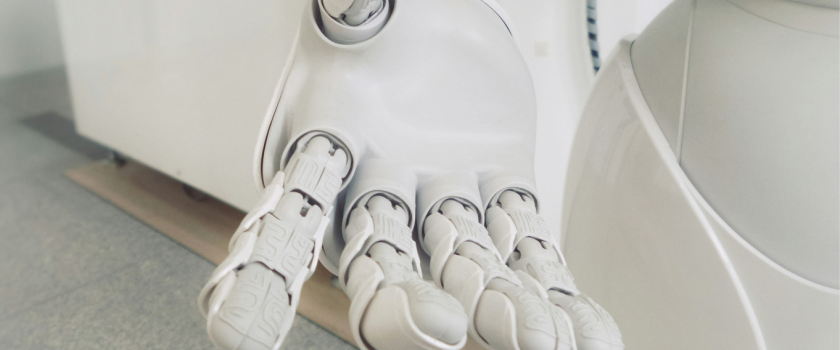Can AI Replace Recruiters? The Reality for the Automotive Recruitment Industry.
 24.04.2025
24.04.2025
 5 mins to read
5 mins to read

A few weeks ago, we shared a post on LinkedIn announcing (tongue firmly in cheek) that our much-loved colleague Martin was being replaced by a humanoid robot called Pepper. The robot would speak with Martin’s voice, be available 24/7, recognise emotions and help candidates in any language.
Of course, it was an April Fools’ joke.
But like all the best jokes, it contained a hint of truth — or at least, a very real question: Can artificial intelligence actually completely replace recruiters?
Let’s take a closer look at where AI fits into our industry – and where it doesn’t.
1. AI is already reshaping recruitment.
It’s not the future, because it’s already happening. According to LinkedIn’s Future of Recruiting 2024 report, around 73% of recruiting pros say hiring based on skills is a priority.
Approximately 27% of talent professionals are currently using or experimenting with generative AI tools, and 62% express optimism about AI’s potential in recruitment.
From sourcing and shortlisting to automated interview scheduling and candidate profiling, AI helps streamline large parts of the recruitment process. AI-powered tools can:
– Analyse thousands of applications in minutes (resume screening).
– Match job descriptions with CVs and profiles.
– Schedule interviews and automate reminders.
– Generating job descriptions.
These tools aim to streamline administrative tasks, allowing recruiters to focus on strategic activities.
2. Will AI replace recruiters?
But There’s a Catch — and It’s a Big One.
AI can do a lot. But it can’t replace the human element.
A recruiter’s job isn’t just about filling vacancies. It’s about:
– Speaking to a candidate who’s just lost their job and needs guidance. In such cases, emotional intelligence is needed.
– Navigating tricky conversations when client expectations shift.
– Picking up on subtle cues that a person may not be the right cultural fit.
– Supporting people through life-changing decisions.
– Building relationships.
– Understanding nuanced candidate motivations.
– Assessing cultural fit.
While AI can enhance efficiency, it cannot replicate the depth of human interaction required to create meaningful candidate experiences.
3. The Role of the Recruiter Is Evolving, Not Disappearing!
What we’re seeing in 2025 isn’t the end of recruiters – it’s a shift in what recruitment means.
Modern recruiters are no longer just matchmakers. They’re:
- Talent acquisition / advisors,
- brand ambassadors,
- strategic business partners.
Organisations that blend automation with human insight are best placed to attract and retain talent in competitive markets. In other words – AI is a tool, not a solution.
Let’s be clear: AI can’t offer empathy. He can’t coach a nervous candidate before an interview, or help navigate difficult salary negotiations. He can’t build relationships based on trust.
But AI can help with admin. He can automate reminders, scan CVs for relevant keywords, and track progress in your ATS (Applicant Tracking System).
Used correctly, AI can enhance what recruiters do, not eliminate them.
So no, Martin isn’t going anywhere. And no robot can replace the value of human connection. Not now, not ever.
4. What About the Automotive Industry in 2025?
AI is reshaping recruitment across all industries, but what does this mean for automotive?
The automotive sector is undergoing rapid transformation. From the rise of electric vehicles to the increasing importance of diagnostic and software skills, the profiles of in-demand candidates are evolving fast. At the same time, labour shortages, wage pressure, and growing skill gaps are making it harder than ever to hire and retain top talent.
In this high-pressure environment, recruitment technology can support speed and precision. AI can help sort CVs, identify certifications, and track hiring trends, but it can’t replace the recruitment industry knowledge needed to match the right technician, painter or prepper to the right workshop.
Skilled automotive roles – from vehicle technicians and bodyshop specialists to diagnostic engineers require practical tests, cultural alignment, and often bespoke relocation support.
At Meenz, we’ve seen firsthand how important the human element remains in this sector. Our recruiters build long-term relationships, understand site-specific requirements, and support candidates through every step of the process – something no algorithm can fully replicate.
5. Summary
While AI is transforming recruitment by automating routine tasks and providing data-driven insights, it is not poised to replace human recruiters. The future of recruitment lies in a synergistic relationship between AI and human professionals, combining technological efficiency with human empathy and judgment.
Moreover, agility is essential. Recruiters need to adapt quickly to changing market conditions, leveraging AI tools while maintaining a human-centric approach.
At Meenz we don’t see technology as a threat, we see it as a partner.
We embrace AI, but we know our real strength lies in people – those who listen, guide, adapt and care. We remain steadfast in our belief that human connection is irreplaceable.
If you’re a candidate, client, or simply curious about what recruitment really looks like in 2025, let’s talk. We’d be happy to show you the human side of the hiring process.





